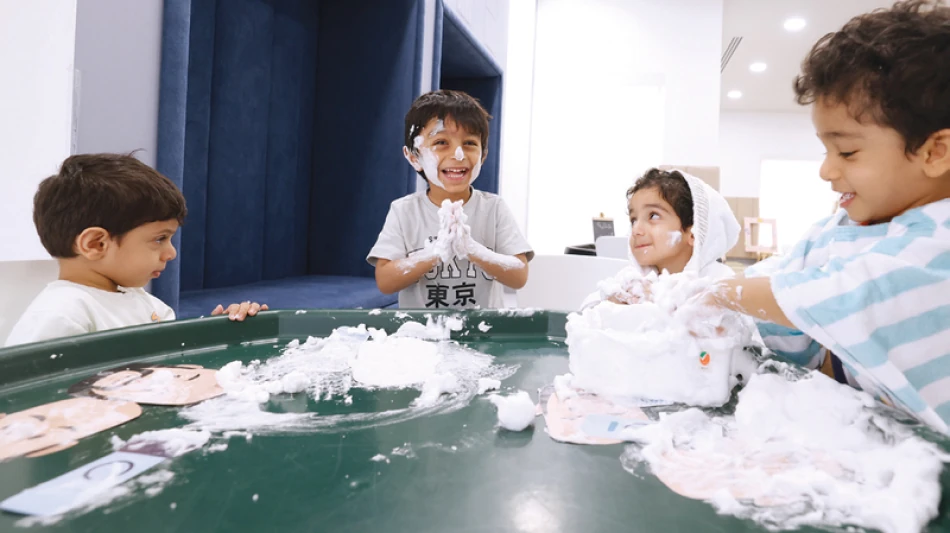
Local-Inspired Preschool Offers Enriching Activities in Fereej Community
Dubai's "Fareej Nursery" Pioneers Cultural Preservation Through Early Childhood Education
Dubai has launched an innovative nursery program that embeds Emirati heritage directly into early childhood education, featuring traditional architectural elements, Arabic-speaking "neighborhood mothers," and culturally-rooted learning spaces. The Fareej Nursery at Um Al Sheif Islamic Cultural Center represents a strategic effort to counter cultural dilution in the UAE's increasingly globalized society, where many children struggle with Arabic fluency due to foreign domestic help and international schooling.
Heritage-Inspired Design Meets Modern Education
The nursery's physical design deliberately mirrors traditional Emirati architecture and social structures. Project manager Hamda Al Matayoui explained that classroom names reflect different childhood stages using heritage terminology. The "Al-Arqoub" class (ages 1-2) references the traditional crawling position of infants, while "Al-Dhabi" (ages 2-3) symbolizes the gazelle-like agility of toddlers learning to walk. The oldest group, "Al-Shara'a" (ages 3-4), evokes sailing and independence.
Central to the facility is "Al-Liwan," inspired by traditional Emirati family gathering spaces where extended families would share meals and stories. This communal area houses interactive corners including "Fareej Salon," "Fareej Henna Corner," and "Fareej Barbershop," creating immersive cultural experiences that many modern Emirati children rarely encounter at home.
Addressing the Language Crisis
The nursery directly tackles a growing concern among Gulf states: children losing fluency in Arabic due to exposure to foreign caregivers and English-dominant environments. Interior designer Fatima Khalifa Al-Hameli, a Zayed University graduate, created wall designs that reinforce local identity, while color schemes adapt to children's developmental stages—muted tones for younger children progressing to brighter colors as visual perception develops.
The "Neighborhood Mothers" Innovation
Perhaps most significantly, the nursery employs "Fareej Mothers"—Emirati women over 50 who serve as cultural ambassadors and emotional anchors for children. This addresses a modern reality: busy parents and geographic separation mean many children see grandparents only weekly, losing crucial cultural transmission that traditionally occurred through extended family networks.
Sheikha Al-Dhaheri, experiencing her first formal employment at this stage of life, described her role as "the nursery's embrace." She teaches authentic Emirati expressions like "hood" (come in), "aqruboo" (come closer), and "marhaba" (welcome), while providing the emotional security traditionally offered by grandmothers.
Economic and Social Impact
The program creates employment opportunities for older Emirati women while addressing childcare needs. Applicants must be UAE nationals, unemployed, over 50, and pass interviews with Dubai's Knowledge and Human Development Authority. This model could be replicated across the Gulf, where similar demographic and cultural challenges exist.
Strategic Alignment with National Priorities
The initiative aligns with Dubai Social Agenda 33, which prioritizes family cohesion and comprehensive emirate development. Launched through collaboration between Dubai's Department of Islamic Affairs and Charitable Activities and the Knowledge and Human Development Authority, it represents systematic cultural preservation rather than symbolic gestures.
Teacher Sara Al-Attar noted the curriculum's unique blend of formal Arabic and Emirati culture within modern educational frameworks—a balance other Gulf states struggle to achieve as they modernize while preserving identity.
Expansion Plans Signal Broader Strategy
A second branch will open in Al-Mizhar Islamic Cultural Center for the 2025-2026 academic year, incorporating elements specific to that area's environment. This expansion suggests the model's success and potential for scaling across Dubai and potentially other emirates.
Regional Implications
The Fareej Nursery represents a sophisticated approach to cultural preservation that other Gulf states are watching closely. Unlike top-down heritage initiatives, this program embeds cultural learning in daily childhood experiences, potentially creating lasting behavioral and linguistic changes. As the UAE continues attracting international residents and businesses, such programs may become essential for maintaining national identity while embracing globalization.
The success of this model could influence educational policy across the region, where governments increasingly recognize that economic diversification must be balanced with cultural continuity to maintain social cohesion and national character.
Most Viewed News

 Sara Khaled
Sara Khaled






